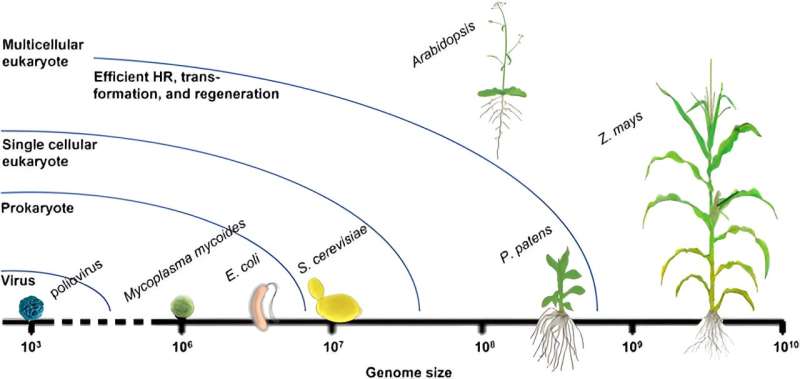This article has been reviewed according to Science X's editorial process and policies. Editors have highlighted the following attributes while ensuring the content's credibility:
fact-checked
trusted source
proofread
Pioneering the future: An innovative approach to plant synthetic genomics

In October 2023, BioDesign Research published a perspective article titled "Toward Synthetic Genomics in Plants." Focusing on the emerging field of plant synthetic genomics, this study delves into the complexity of assembling and engineering large genomes, a task made challenging by the abundance of transposons and complex epigenetic regulations in multicellular eukaryotes.
Using the model moss Physcomitrium patens as a start, this article proposes a new bottom-up approach to genome synthesis in multicellular plants. This moss is an ideal candidate due to its capabilities for homologous recombination, DNA delivery, and regeneration, setting a precedent for future optimizations in more complex seed plants.
Addressing technical hurdles, the article discusses challenges such as genome assembly and plant transformation. It also provides insights into the intricacies of DNA synthesis, citing the successful engineering of viral, bacterial, and yeast genomes using bottom-up approaches and examining the potential for applying these techniques to more complex organisms.
The study emphasizes the top-down approach traditionally used in plant synthetic genomics and highlights recent breakthroughs as well as limitations that must be overcome for wider application. It also underscores the importance of overcoming challenges related to chromosome assembly, functional centromere establishment, efficient transformation, and regeneration in seed plants.
Concluding with an optimistic outlook, the article suggests that plants, due to their unique characteristics and ethical considerations, are likely to be at the forefront of pioneers of genome synthesis in multicellular organisms. The experience and knowledge gained from C. glauca will be invaluable in applying these techniques to seed plants, including crops.
In summary, this article opens a new door in the field of synthetic biology and offers promising avenues for future biotechnological breakthroughs and a deeper understanding of plant genomics.
More information: Yuling Jiao et al, Towards Plant Synthetic Genomics, BioDesign Research (2023). DOI: 10.34133/bdr.0020
Provided by NanJing Agricultural University


















